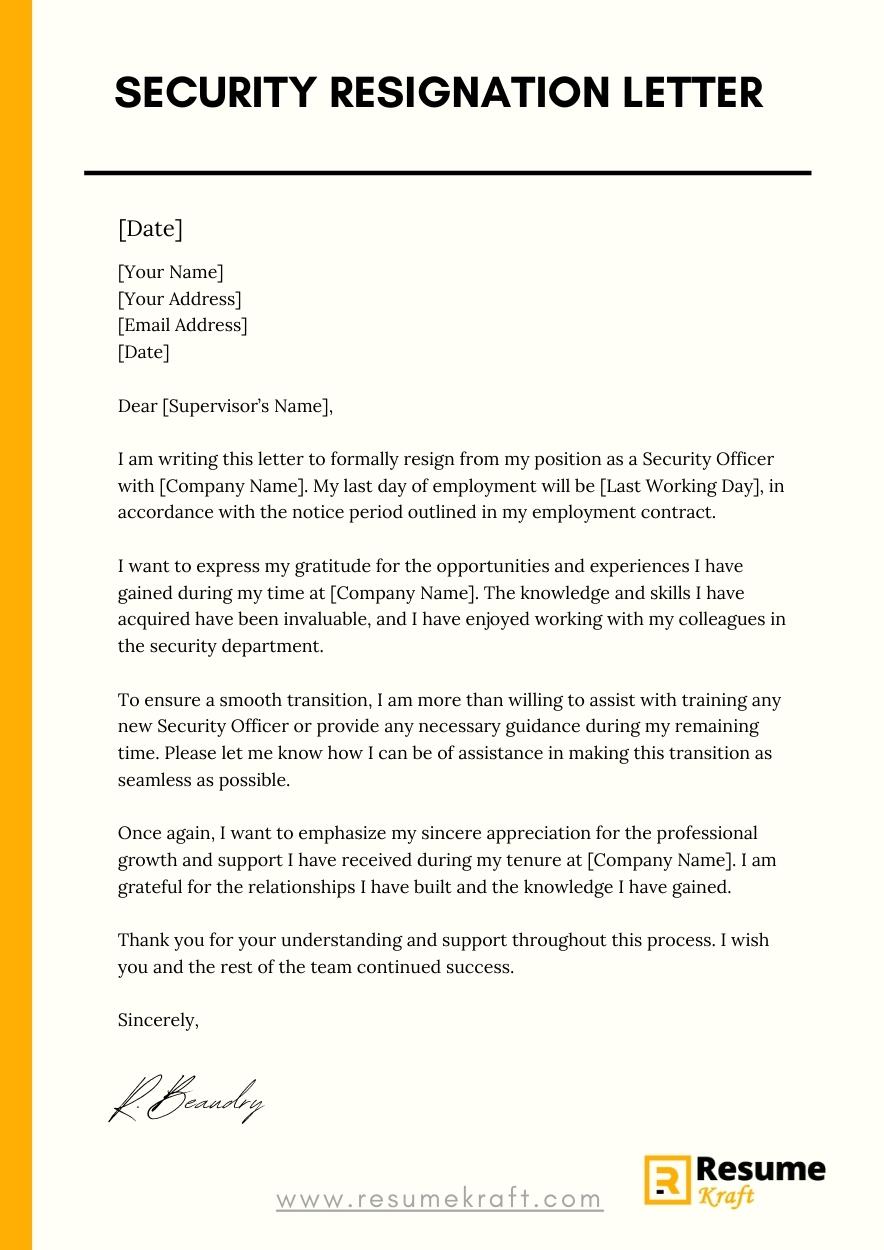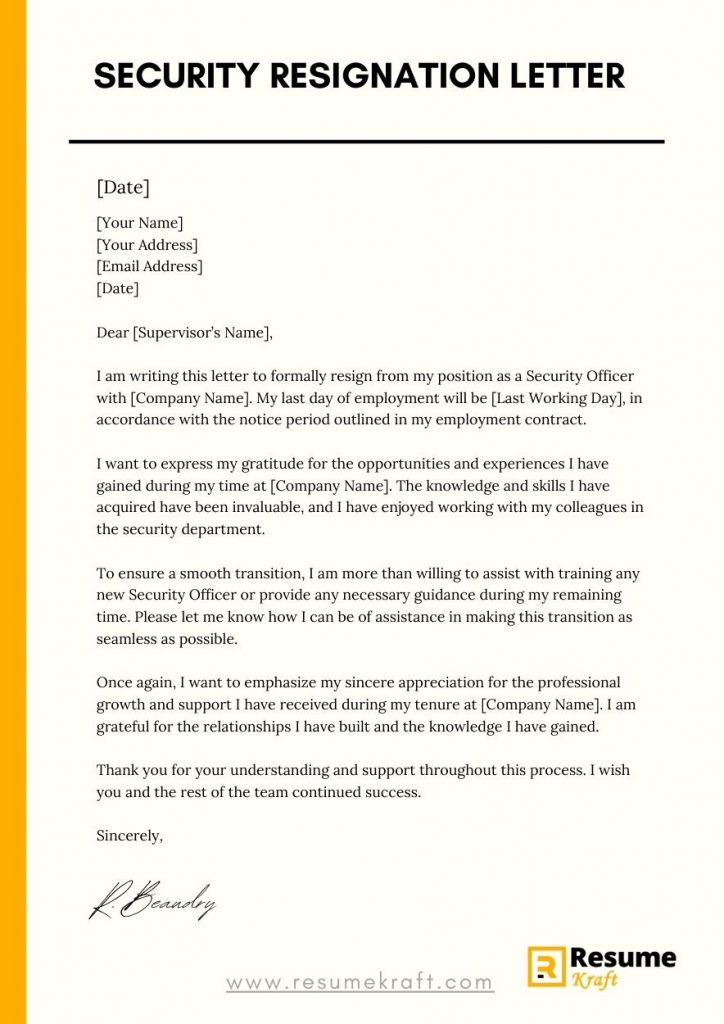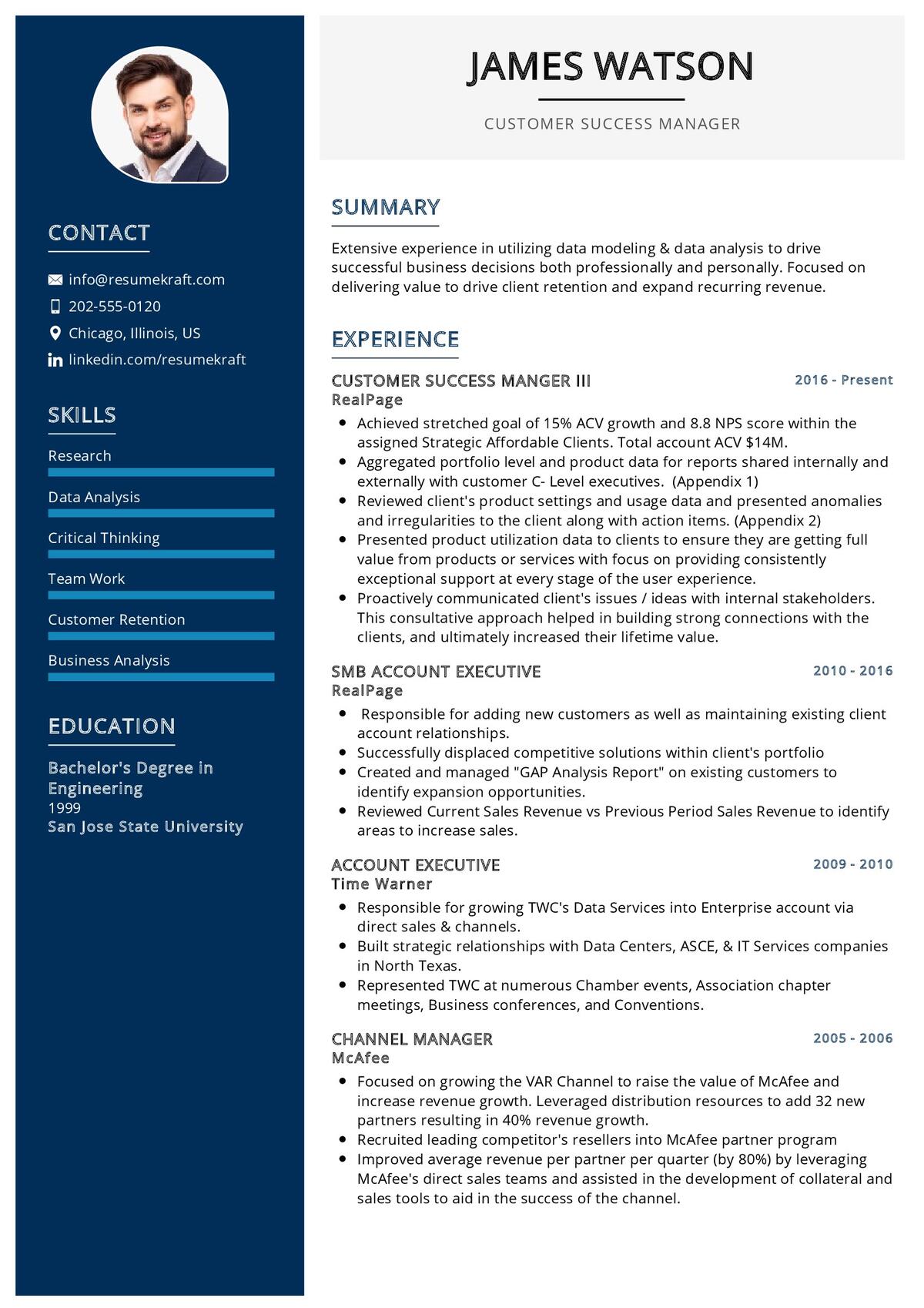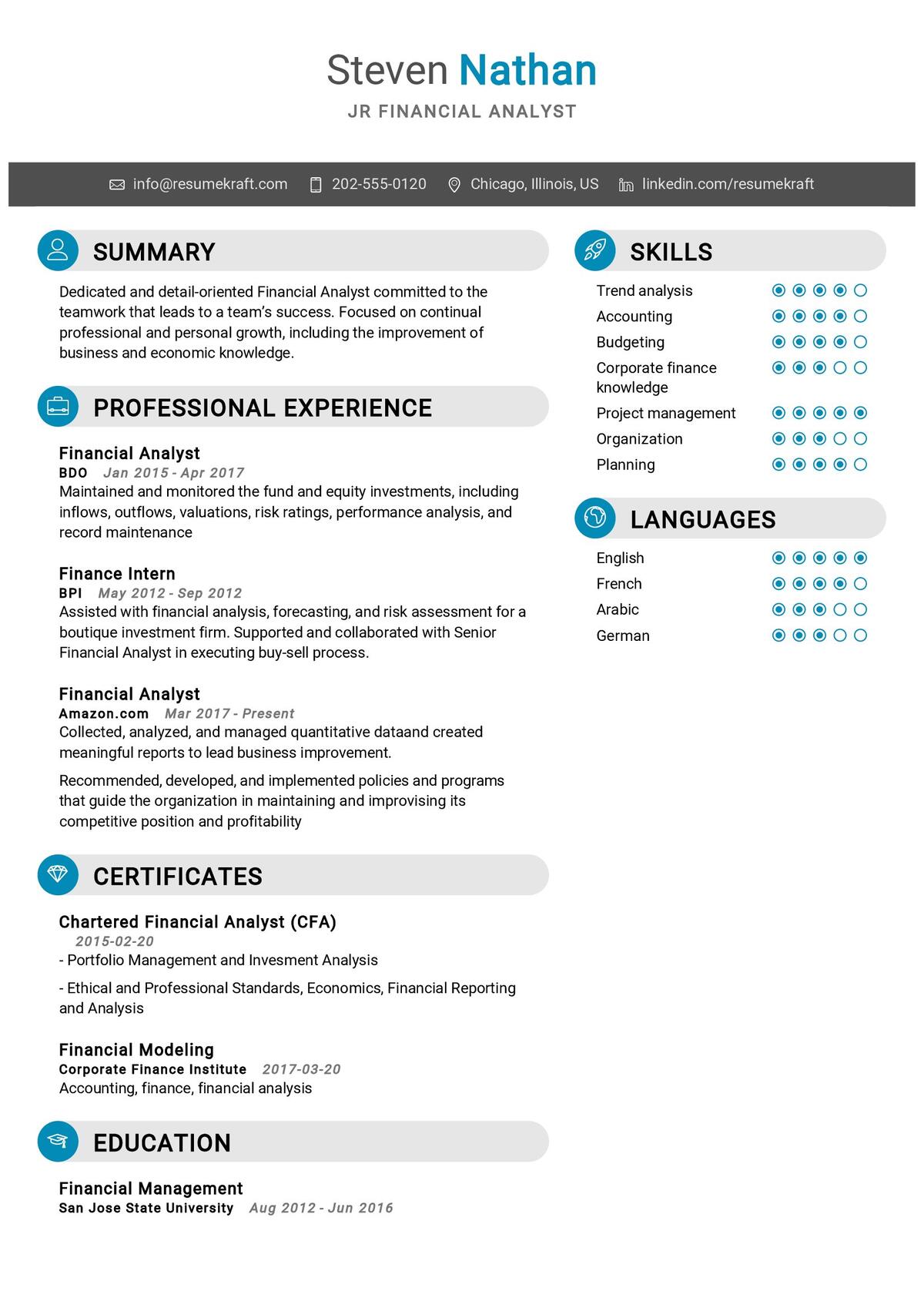
Leaving a job can be a difficult decision, and it is important to handle the resignation process professionally and respectfully. One of the key steps in resigning from a security position is writing a resignation letter. A resignation letter serves as a formal notice to your employer, explaining your intention to leave the company. In this article, we will guide you through the process of writing a security resignation letter, provide samples for different formats, and offer helpful tips to ensure a smooth transition.
When composing a security resignation letter, it is essential to include specific details about your departure, express gratitude, and maintain a positive tone. Additionally, formatting the letter correctly and knowing what not to include are equally important. By following the guidelines outlined in this article, you can create a well-crafted resignation letter that leaves a positive impression on your former employer. So, let’s dive in and learn how to write an effective security resignation letter.
What To Include in a Security Resignation Letter
To ensure your security resignation letter is professional and comprehensive, consider including the following information:
1. Header Section
Begin your resignation letter with a professional header that includes your name, address, phone number, and email address. Skip a couple of lines and include the current date.
2. Addressee
Add the name and title of your direct supervisor or the appropriate individual(s) you are addressing the letter to. If you’re unsure, consult your employee handbook or ask your human resources department for guidance.
3. Salutation
Use a professional salutation to address the recipient, such as “Dear [Supervisor’s Name].”
4. Opening Paragraph
Start your resignation letter with a clear and direct statement of intent, informing your employer of your decision to resign from your security position, including the specific date of your last working day. Also, briefly express gratitude for the opportunities and experiences gained during your employment.
5. Body Paragraph(s)
In the body of the letter, you can provide a concise explanation for your resignation. It is essential to maintain a positive tone, even if you have negative reasons for leaving, as this helps to preserve relationships and your professional reputation.
6. Offer Assistance
Express your willingness to assist with the transition process or offer training to ensure a smooth handover. Providing assistance demonstrates your professionalism and commitment to the company until your last day.
7. Closing Paragraph
End your resignation letter on a positive note by expressing gratitude once again for the opportunities afforded to you and reiterating your commitment to a smooth transition. Close with a polite and professional sign-off, such as “Sincerely” or “Best regards.”
8. Signature
Below the sign-off, leave enough space for your handwritten signature. If you’re sending the letter via email, include a typed version of your full name.
What Not to Include in Your Security Resignation Letter
While it is important to be professional and respectful in your security resignation letter, there are certain things you should avoid mentioning. Here are some things not to include in your letter:
1. Negative Comments
Avoid expressing negative opinions or criticisms about the company, your colleagues, or your supervisor in your resignation letter. Keep the tone positive and focus on your own personal reasons for leaving.
2. Emotional Statements
While it may be tempting to include emotional statements or personal grievances, it is best to refrain from doing so. Your resignation letter should be concise, professional, and focused on the facts.
3. Excessive Details
Keep your resignation letter brief and to the point. Avoid including unnecessary details or lengthy explanations. Stick to the essentials and save any further discussions for face-to-face conversations, if necessary.
4. Requests for Counteroffers
Your resignation letter is not the appropriate place to request a counteroffer or negotiate better terms. Once you have made the decision to resign, it is best to avoid reconsidering it, as it may lead to confusion and strain relationships.
5. Threats or Ultimatums
Under no circumstances should you include threats or ultimatums in your resignation letter. Maintain a professional and respectful tone throughout the entire letter, even if you are leaving due to challenging circumstances.
How To Format a Security Resignation Letter
Formatting your security resignation letter correctly is essential to create a professional and visually appealing document. Consider the following formatting tips:
1. Use a Business Letter Format
Begin your resignation letter with a professional letterhead containing your contact information. Use a standard font and maintain a consistent font size throughout the letter.
2. Keep It Concise
Resignation letters should generally be kept to one page. Be clear and succinct in your writing, ensuring you include all necessary details without excessive elaboration.
3. Maintain Consistent Formatting
When it comes to formatting, consistency is key. Align your text to the left margin, use single-spacing between paragraphs, and double-space between major sections.
4. Proofread and Edit
Before submitting your resignation letter, review it carefully for any grammatical or spelling errors. Double-check the formatting to ensure consistency and clarity. It may also be helpful to have a trusted friend or colleague review your letter before sending it.
Security Resignation Letter Samples
Here are two examples of security resignation letters, one in a printed letter format and the other in an email format, both adhering to the guidelines discussed above:

Printed Resignation Letter Sample
[Your Name]
[Your Address]
[City, State, ZIP Code]
[Phone Number]
[Email Address]
[Current Date]
[Supervisor’s Name]
[Company Name]
[Company Address]
[City, State, ZIP Code]
Dear [Supervisor’s Name],
I am writing this letter to formally resign from my position as a Security Officer with [Company Name]. My last day of employment will be [Last Working Day], in accordance with the notice period outlined in my employment contract.
I want to express my gratitude for the opportunities and experiences I have gained during my time at [Company Name]. The knowledge and skills I have acquired have been invaluable, and I have enjoyed working with my colleagues in the security department.
To ensure a smooth transition, I am more than willing to assist with training any new Security Officer or provide any necessary guidance during my remaining time. Please let me know how I can be of assistance in making this transition as seamless as possible.
Once again, I want to emphasize my sincere appreciation for the professional growth and support I have received during my tenure at [Company Name]. I am grateful for the relationships I have built and the knowledge I have gained.
Thank you for your understanding and support throughout this process. I wish you and the rest of the team continued success.
Sincerely,
[Your Name]
[Handwritten Signature]
[Typed Full Name]
Email Resignation Letter Example
Subject: Resignation Letter – [Your Name]
Dear [Supervisor’s Name],
I hope this email finds you well. I am writing to inform you of my decision to resign from my position as a Security Officer at [Company Name], effective [Last Working Day]. I have attached a formal resignation letter for your records.
I want to express my deepest gratitude for the opportunities and support I have received during my time at [Company Name]. It has been a pleasure working alongside such dedicated and professional colleagues in the security department.
In order to ensure a seamless transition, please let me know how I can assist with the handover process. I am more than willing to provide training or any other support necessary to help onboard a new Security Officer.
I want to once again extend my sincere appreciation for the growth and development I have experienced while working at [Company Name]. The relationships I have formed and the knowledge I have gained will be invaluable in my future endeavors.
Thank you for your understanding and support throughout this transition. Should you need any further information or assistance, please do not hesitate to reach out.
Best regards,
[Your Name]
[Typed Full Name]
[Phone Number]
[Email Address]
Planning to Write a Resume?
Check our job winning resume samples


Key Takeaways
Writing a security resignation letter is a crucial step in the transition process when leaving a security position. Some key takeaways to remember include:
- Begin with a professional header, ensuring you include your name, address, phone number, and email address.
- Address the letter specifically to your supervisor or appropriate individual(s).
- Start with a clear statement of resignation, along with the date of your last working day.
- Keep the body of the letter concise, positive, and professional.
- Offer assistance or training to ensure a smooth handover.
- Maintain a positive tone throughout, expressing gratitude for the opportunities and experiences gained.
- Format the letter correctly, proofread carefully, and double-check for any errors.
By following these guidelines and utilizing the provided security resignation letter samples, you can confidently navigate the resignation process and leave a positive impression on your former employer.
Frequently Asked Questions
Q: How far in advance should I submit my security resignation letter?
A: It is generally advisable to submit your security resignation letter at least two weeks before your intended last working day. However, refer to your employment contract or company policies for specific notice period requirements.
Q: Should I mention negative reasons for leaving my security position in the resignation letter?
A: It is generally best to keep your resignation letter positive and avoid mentioning negative reasons for leaving. Maintain a professional tone and focus on expressing gratitude for your experiences and the skills gained during your employment.
Q: Can I request a counteroffer in my security resignation letter?
A: No, your resignation letter is not the appropriate platform to request a counteroffer or negotiate better terms. Once you have made the decision to resign, it is best to stick to your decision and avoid confusion or strain on professional relationships.
Q: Is an email resignation letter acceptable for a security position?
A: Yes
, an email resignation letter is generally acceptable for a security position. However, it is still important to maintain a professional tone, format the email correctly, and attach a formal resignation letter as a document for reference.
Q: Can I include personal grievances or emotional statements in my security resignation letter?
A: It is best to avoid including personal grievances or emotional statements in your resignation letter. Keep the focus on the facts and maintain a professional and respectful tone throughout the letter.
Q: Should I discuss my future plans or reasons for leaving in detail?
A: While you can briefly mention your reasons for leaving, it is not necessary to go into extensive detail in your security resignation letter. Keep the letter concise and professional, and save further discussions about your future plans for face-to-face conversations, if necessary.
Conclusion
Writing a security resignation letter may seem like a daunting task, but with the right guidance, it can be a smooth and professional process. By including the necessary details, maintaining a positive tone, and formatting the letter correctly, you can ensure a proper and respectful resignation. Remember, a well-crafted resignation letter reflects your professionalism and can leave a lasting positive impression on your former employer. Best of luck in your future endeavors!

